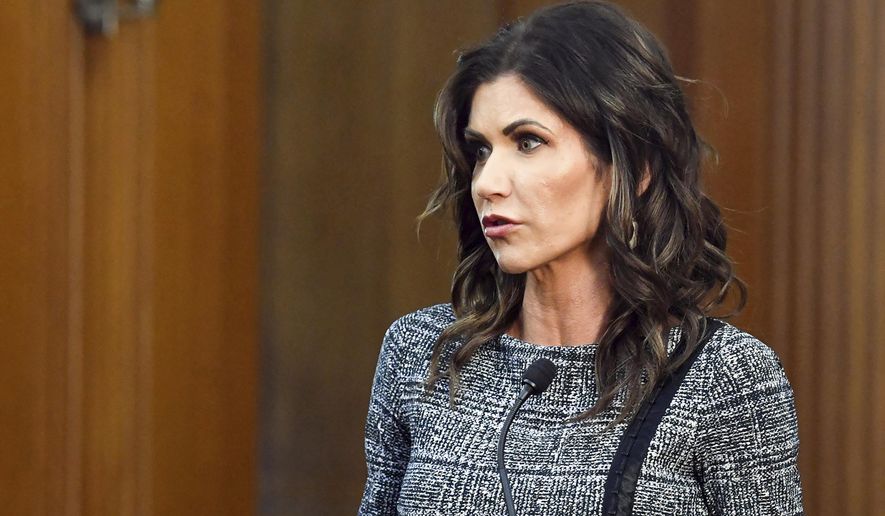PIERRE, S.D. (AP) - South Dakota Gov. Kristi Noem’s effort to limit the powers of conservation officers suffered a partial setback in the Legislature on Tuesday, with debate in one Senate committee resulting in a lively exchange between her staff and Republican senators.
As senators criticized Noem’s proposal to keep conservation officers from the Department of Game, Fish and Parks from entering private property without permission, Noem’s general counsel, Mark Miller, rose from the audience to speak. He was quickly rebuked by Republican Sen. Arthur Rusch, who told him he was out of order.
Despite Miller’s argument that the bill would protect property rights, the panel of Republican senators unanimously dismissed it, with one powerful senator, Lee Schoenbeck, calling it “a slap in the face of conservation officers.” However, the bill could be revived by a legislative maneuver called a “smoke out” that requires one-third of the Senate’s support.
The Republican governor pressed senators to pass the bill in a letter on Tuesday, writing, “Property rights should be respected in South Dakota. That’s what this bill does: respect property rights.”
The Republican governor this year has pitched two bills aimed at placing limitations on conservation officers. As senators mulled over them Tuesday, the bills got mixed reviews: The Senate Judiciary Committee rejected Noem’s bill to keep officers from entering private property without permission; while the Senate Agriculture and Natural Resources Committee unanimously approved her proposal to stop officers from seizing hunting or fishing equipment.
The debate in the Senate Judiciary committee pitched a former Secretary of Game, Fish and Parks, John Cooper, against the current interim secretary, Kevin Robling, as well as Noem’s general counsel, Miller, against an all-Republican panel of senators.
Noem last month highlighted the bill addressing private property access, saying it was an “opportunity for us to continue to strengthen the relationships that our conservation officers have with landowners.”
The Department of Game, Fish and Parks currently has a policy of not allowing its officers to enter private property without permission, unless they have a reasonable suspicion that a crime is happening. The practice was developed over a decade ago to smooth tensions between property owners and conservation officers, and Robling said he wanted that policy to be enshrined in law.
Larry Nelson, a property owner in Harding County, said the fact that conservation officers are allowed to access his land without permission has made him reconsider whether he wants to give hunters access on the land at all.
But environmental groups pointed out the proposal would make it harder for conservation officers to enforce illegal hunting and fishing.
“Pursuing game or fish is a privilege, it’s not a right in South Dakota,” said Zach Hunke, the president of the South Dakota Wildlife Federation. “This bill, quite frankly, only benefits poachers.”
In the end, the senators unanimously dismissed the bill, reasoning that a clause in it would bar courts from using evidence that conservation officers had gathered while they were in violation of the proposed law. Schoenbeck argued the bill would disrupt conservation officer’s abilities to do other parts of their work, calling it “a radical deviation from a system that is working.”
Ian Fury, Noem’s spokesman, said after the bill’s dismissal that she “ will continue to protect the property rights of South Dakotans.”
Meanwhile, the governor’s proposal to stop conservation officers from taking hunting or fishing equipment from people violating the law - an act known as civil asset forfeiture - received a warmer reception from senators. The Senate Agriculture and Natural Resources endorsed it unanimously, sending it to the full Senate where it will face a final legislative hurdle before Noem can sign it into law.
Sen. Herman Otten, a Republican, said the proposal keeps officers from confiscating fishing equipment or hunting rifles just because someone goes over their hunting or fishing limit.
While the lone Democrat on the committee, Sen. Troy Heinert, voted to pass the bill, he said he had questions about whether it would keep conservation officers from enforcing serious poaching, such as from an airplane or snowmobile. He said he would continue to weigh the bill as it heads to a full meeting of the Senate, but appreciated the property protections it would give.
“I don’t think they should take your pick up because you’re hauling a poached deer,” said Democratic Sen. Troy Heinert. “That makes no sense.”




Please read our comment policy before commenting.